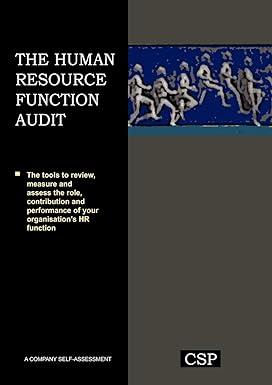Question
Plan Ahead, Inc. established a defined contribution 401(k) plan for its employees effective January 1, 2015. Contributions to the plan consist of employee 401(k) deferrals,
Plan Ahead, Inc. established a defined contribution 401(k) plan for its employees effective January 1, 2015.
Contributions to the plan consist of employee 401(k) deferrals, an employer discretionary matching contribution and a discretionary profit sharing contribution.
Employees age 21 or older are immediately eligible to participate in 401(k). However, to be eligible to participate in the matching portion of the retirement plan, an employee must be age 21 and have been employed for 1 year. An employee enters the plan on the January 1 or July 1 after or coinciding with meeting the eligibility requirements.
For the year ended December 31, 2015, Plan Ahead decided to match employee deferrals 50% up to a 5% deferral on their eligible compensation. The corporation also decided to contribute $100,000 as a profit sharing contribution. Employees that make more than $115,000 (compensation benchmark) are to receive 5.7% of the difference in their compensation (defined here as total eligible wages) over the $115,000. The remaining amount is allocated to all eligible participants on a pro-rata basis based on their compensation, or the compensation benchmark, if they participated in the 5.7% allocation.
There are no additional requirements to be eligible to share in the matching contribution; however, a participant must qualify for matching, be employed on the last day of the plan year, and work at least 1000 hours in the current year to share in the profit sharing allocation. Normal retirement per the plan is the date the participant reaches age 65. If a participant retires, there are no additional requirements to share in the profit sharing allocation.
Recognized plan compensation does not exceed $245,000. Compensation is only recognized from plan entry date to the end of the plan year for participants that become eligible during the plan year. Assuming that an employee qualifies for the matching, treat all deferrals of compensation as being made during a period(s) in which the employee qualifies for the matching funds.
The $245,000 limit on plan compensation should be applied after any assessments that involve calculating how much an employee earns in the second half of the year. In other words, if an employee earns $300,000 for the entire year and he/she only qualifies for Matching or Profit Sharing as of July 1, the amount earned for the second half of the year will be used for the Matching and Profit Sharing calculations, as long as that amount does not exceed $245,000.
For the year ended December 31, 2015, the employee census consisted of the following:
Date of Birth
Date of Hire
Total Wages
Wages as of June 30, 2015
401(k) Deferral
Hours Worked in 2015
Separation Date
Michael Blackman
5/6/1965
1/1/2009
$350,000
$100,000
$16,500
2,080
Kiera Hughes
11/15/1970
6/20/2012
$36,000
$15,000
$2,000
2,080
Larry Ennis
1/11/1977
7/1/2014
$225,000
$50,000
$12,500
2,080
John Miller
5/24/1972
5/12/2008
$60,000
$60,000
$9,000
2,080
6/1/2015
Kevin Babb
4/12/1986
6/25/2013
$20,000
$9,800
$0
2,080
Patsy Gregg
2/20/1983
5/15/2015
$165,000
$15,000
$4,000
1,400
Rick VanHarn
6/28/1996
8/10/2014
$35,000
$17,000
$3,500
2,080
David Tucker
12/19/1973
9/5/2012
$175,000
$85,000
$16,500
2,080
Chelsea Webb
7/1/1994
10/10/2013
$290,000
$150,000
$20,000
2,080
Betty Walters
9/7/1989
11/19/2010
$155,000
$25,000
$8,000
2,080
Andrew Wheeler
11/24/1986
4/25/2014
$38,000
$32,500
$6,000
1,400
7/3/2015
Douglas Fowler
2/1/1950
8/11/2009
$4,000
$4,000
$400
160
2/1/2015
Robert Bell
2/26/1967
5/3/2011
$42,000
$21,000
$4,200
980
Samantha Frye
8/5/1971
8/15/2014
$127,000
$0
$16,500
1,400
Thomas Snider
10/1/1976
4/16/2009
$84,000
$40,000
$0
2,080
Denise Evans
7/1/1982
10/4/2013
$47,000
$24,000
$6,000
720
Christopher Wade
9/20/1977
1/3/2014
$90,000
$40,000
$14,000
2,080
Lauren Hicks
1/2/1994
6/20/2013
$250,000
$50,000
$15,000
1,800
Which employees qualify for the matching?
Someone please show me how to do this in excel! Please create another column that states either Qualifies or Does not qualify.
Could you also show the cell formula so I can do this on my own? Thanks
Step by Step Solution
There are 3 Steps involved in it
Step: 1

Get Instant Access to Expert-Tailored Solutions
See step-by-step solutions with expert insights and AI powered tools for academic success
Step: 2

Step: 3

Ace Your Homework with AI
Get the answers you need in no time with our AI-driven, step-by-step assistance
Get Started


